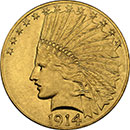$10 Indian

Description
True to form, very few gold coins in early years were produced as Proofs. It is suggested that since Proof pieces usually carried a healthy premium, people chose to collect coins that were infinitely less valuable to begin with. To store something as valuable as gold, just for the purpose of collecting, seemed unfashionable to say the least. In 1813 the John Reich design was modified to a portrait featuring the head and part of the neck of Miss Liberty, facing left, an abbreviated version of the earlier style. In the new version, the stars completely surround the head, and the date is below. The reverse motif remains the same. From 1813 to 1829 half eagles were minted with a diameter of 25 mm. In 1829 the diameter was reduced to 22.5 mm and certain other modifications occurred, under the direction of William Kneass. Technically speaking, the 1829-1834 reduced diameter format can be considered a separate type, but as half eagles of this era are exceedingly rare, most numismatists have been content to consider the span 1813-1834 as a single design Although mintages were fairly generous for many half eagles from 1813 through 1834, nearly all of the issues in this span are great rarities today. The type set collector will have the best luck and the best use of his money if an issue such as 1813, 1814/3, 1818, or 1820 is selected, none of which will be inexpensive, but other issues are apt to be much more costly.
Valuation
The half eagle of the 1813-1834 design type is one of the highlights of a type set of early American gold coins.
- COIN NAME
- $10 Indian
- DESIGNED BY
- Augustus Saint-Gaudens
- ISSUE DATE
- 1813-1834
- COMPOSITION
- 0.9167 part gold, 0.0833 part copper
- DIAMETER
- 25 mm (1813-1829) 22.5 mm (1829-1834)
- WEIGHT
- 135 grains
- EDGE
- Reeded
- BUS MINT
- 1,385,612
- PROOF MINT
- Fewer than 150
The statements made on this Website are opinions only. Past results are no guarantee of future performance or returns. Precious metals, like all investments, carry risk. Precious metals and coins may appreciate, depreciate, or stay the same depending on a variety of factors. Lear Capital, LLC cannot guarantee, and makes no representation, that any metals purchased will appreciate at all or appreciate sufficiently to make customers a profit. Lear is a retail seller of precious metals and its buyback (or bid) prices are lower than its sell (or ask) prices. Metals must appreciate enough to account for this difference in order for customer to make a profit when liquidating the metals. Lear does not provide financial advice or retirement planning services. The decision to purchase or sell precious metals, and which precious metals to purchase or sell, are the customer’s decision alone, and purchases and sales should be made subject to the customer’s own research, prudence and judgment.
